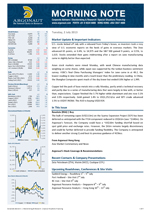Market Update & Important Indicators
US stocks have closed a choppy week on a down note, following European markets lower on fears of a Greek debt default. The Dow Jones Industrial Average fell 140.53 points (0.78 per cent) to 17,898.84 on Friday. The broad-based S&P 500 fell 14.75 points (0.70 per cent) at 2,094.11, while the tech-rich Nasdaq Composite Index dropped 31.41 points (0.62 per cent) to 5,051.10. European equity markets tumbled as eurozone officials confirmed that at a meeting in Bratislava on Thursday they had war-gamed "worst case" scenarios of Greece not being able to pay its bills. Next week's Federal Reserve policy meeting that will update the Fed's plan to hike interest rates in the coming months. Petroleum stocks dropped on lower oil prices. Dow members Chevron and ExxonMobil fell by 1.2 per cent and 1.3 per cent respectively, while offshore driller Transocean lost 2.0 per cent. Pharmaceuticals were also weak. Merck lost 1.8 per cent, while biotech companies Amgen and Biogen both fell 1.2 per cent. In the tech sector, Intel lost 1.7 per cent and Apple and Cisco Systems both fell 1.1per cent. All three companies are in the Dow.
Europe's main stock markets have sunk as eurozone officials reportedly discussed a "worst case" scenario of a Greek default, the day after key creditor IMF said they were far off reaching a deal. London's benchmark FTSE 100 index of top companies closed down 0.90 per cent at 6,784.92 points on Friday. In the eurozone, the CAC 40 in Paris lost 1.41 per cent to end the day at 4,901.19 points, and Frankfurt's DAX 30 dropped 1.20 per cent to 11,196.49 points. Athens' main index plunged 5.92 per cent to 774.16 points, giving up most of its optimistic eight per cent surge the day before. In Brussels eurozone officials told AFP that at a meeting in Bratislava on Thursday they had war-gamed "worst case" scenarios of Greece not being able to pay its bills. "In discussions, a default was mentioned as one of the scenarios that can happen when everything goes wrong," said one official on condition of anonymity. "Time is running out for Greece. To clinch a deal at the 18 June Eurogroup meeting of finance ministers in time for the 30 June expiry of the current bailout deal, the Greek government has to shift its position very soon, that is within about three days". After the markets closed, the Greek government issued a statement saying it would make "counter-proposals" on a deal to unlock much-needed bailout funds in Brussels on Saturday.
The euro retreated in Asia on concerns about Greece's bailout reform talks after the IMF walked out, while Japanese stocks ended higher thanks to a pick-up in the dollar against the yen. Regional investors were given another positive lead from Wall Street following a better-than-forecast US retail sales report. Tokyo climbed 0.12 per cent, or 24.11 points, to 20,407.08, although the gains were capped by worries about the Greece talks. Hong Kong rose 1.39 per cent, or 372.69 points, to close at 27,280.54 and Shanghai added 0.87 per cent, or 44.76 points, to 5,166.35.
The Australian market looks set to open slightly lower after US and European markets fell on Friday amid fears over a Greek debt default. The June share price index futures contract was down six points at 5,528. On Friday, US and European stocks fell following a breakdown in talks between Greece and creditors. In Australia, the market on Friday followed commodity prices lower after the ASX made gains earlier in the week. The benchmark S&P/ASX200 index lost 11.4 points, or 0.21 per cent, to 5,545.3. The broader All Ordinaries index shed 10.5 points, or 0.19 per cent, to 5,552.1.
ENERGY
Oil prices have fallen despite a drop in the US rig count following news that Saudi Arabia could further boost output in an already glutted market. US benchmark West Texas Intermediate for July delivery shed 81 cents to $US59.96 ($A77.31) a barrel on the New York Mercantile Exchange on Friday. European benchmark Brent oil for July delivery fell $US1.24 to $US63.87 a barrel in London. The US oil rig count dropped by seven to 635 in the week ending June 12, according to Baker Hughes. The rig count is down nearly 60 per cent from a year ago. Analysts pointed to comments from Saudi Aramco executive Ahmed al-Subaey, who said in India that the world's biggest oil exporter may increase production further from record levels to meet demand. Aramco is in talks with Indian buyers to supply more oil, Subaey told Reuters. The pledge of potentially higher Saudi production has really put the market on its back. Commerzbank said the Saudi stance would mean that "the only way for the market to tighten is if non-OPEC supply were reduced." "The key factor will therefore be whether US oil production begins falling as anticipated by the US Energy Information Administration. If not, the ongoing oversupply is likely to continue weighing on prices in the second half year too."
Brent rose 1.2% to US$63.88/bbl. Metals on the LME were down across the board with Copper and Zinc the only exceptions, up 0.5% and 0.2% respectively. Gold was down 0.1% to US$1,190/oz. Iron ore fines fell 0.7% to US$65.13/t.
Argonaut thought for the Day
US Weekly Petroleum Status Report
US crude stocks take a tumble
• US crude oil stocks fell sharply last week, registering the largest weekly decline since July last year. This was in contrast to the previous three weeks of data which had suggested the pace of the stock drawdown was easing.
• The EIA’s weekly US Petroleum Report, released earlier today, shows the amount of crude oil in commercial storage tanks decreased by about 6.8 million barrels to 470.6 million. (See Chart 1.) This was much more than analysts’ expectations of a 1.7 million barrel decrease. But it was in line with the 6.7 million barrel fall estimated by the American Petroleum Institute (API), an industry body, yesterday. Meanwhile, stocks of gasoline dropped by 2.9 million barrels to 217.4 million. However, Chart 2 makes it clear that stocks have still got a very long way to fall before they come into line with historical averages. Indeed, even if crude oil stocks continue declining at last week’s rate of about one million barrels per day it will still take almost four months for stocks to return to more normal levels.
• The amount of crude oil used by US refineries rose to its highest level since this time last year. (See Chart 3.) Demand usually increases around this time of the year as US consumers drive more. We therefore expect inputs into refineries to continue to increase in the coming weeks. That said, refineries are still limited by the amount of light, sweet oil they can process. Oil production also rose very slightly in a further sign that output is levelling out. The plunge in net crude oil imports, which fell by almost 750,000 barrels per day or 5% y/y (see Chart 4), explains most of the drop in stocks.
• The upshot is that even though the pace of stock drawdowns seems to have increased again, supplies are set to remain ample. As a result, we think that the risks to prices are weighted to the downside. The end-2015 forecast for Brent remains $60 per barrel.
Argonaut’s Stock Coverage & Recommendations
Recent Contacts & Presentations
Orbital (OEC), Site Group (SIT), Saracen (SAR), Kibaran (KNL), Sino Gas & Energy (SEH), Rewardle (RXH), Alexium (AJX), Ausdrill (ASL), Tox Free (TOX), OBJ Limited (OBJ), Dacian (DCN), Saracen (SAR), Fertoz (FTZ), Atrum (ATU), Doray (DRM), Buru Energy (BRU), Carnarvon Energy (CVN), Otto Energy (OEL), Empire Oil & Gas (EGO), Pura Vida Energy NL (PVD), MZI Resources (MZI), High Peak Royalties (HPR), Spookfish (SFI)
Please read Argonaut's Important Disclaimers & disclosures
Log in to the client area below to download the full Morning Note PDF


